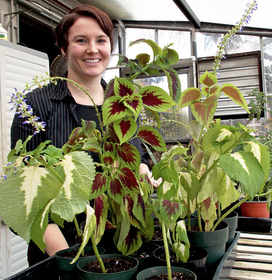TIGARD, OR--(Marketwired - Feb 18, 2015) - Elite Care knows firsthand the positive impact therapeutic horticulture can have on residents living with Alzheimer's and dementia. According to Alzheimer's Weekly, horticultural therapy helps overcome short-term memory loss by bringing back good feelings and lost moments from the past. Its practice can help overcome dementia's limitations by offering purposeful, creative work.
With the launch of its new therapeutic horticulture program, Elite Care is committed to making this an integral part of its overall philosophy of care. To ensure the program's success, Tara Hicks, a registered horticultural therapist, has been brought on as the newest member of the Elite Care team as the garden activities coordinator. Hicks brings an enormous amount of expertise and is leading the implementation of breakthrough horticultural therapy for residents.
The addition of Hicks allows Elite Care to broaden the existing therapeutic horticulture practices by continuing activities such as produce cultivation and flower arranging, in addition to implementing new outdoor therapies to help with all aspects of residents' health and well-being.
Elite Care blazes trails with therapeutic horticulture addition
"With its new team member, Elite Care has become one of only two memory care communities in Portland to have a full-time on-site registered horticultural therapist who will guide residents in their gardening, cultivating and nature endeavors. Elite Care knows how important this implementation will be, as the senior population is growing, and there is a clear need for a variety of coping techniques and practices such as therapeutic horticulture," said Jason Hess, Elite Care's Chief Executive Officer.
According to a July 1998 article published in The New York Times titled "Good Nights for Alzheimer's Patients and Helpers," horticulture therapy benefits the population by "lowering blood pressure, stimulating the senses of smell and touch, giving patients a sense of control over their lives, and aiding in memory."
Therapeutic horticulture improves the well-being of those living with memory loss
Utilizing therapeutic horticulture as a tool for those living with memory loss is a popular and widely successful practice across the country. Positive responses from residents come in various forms. "It enhances cognitive functioning, improves concentration and stimulates memory. It improves quality of life, increases self-esteem, reduces stress, improves mood and alleviates depression. This therapy also decreases heart rate, improves motor skills and hand-eye coordination," said Tara Hicks, Elite Care's garden activities coordinator, referencing the American Horticultural Therapy Association, Definitions and Positions document.
About Elite Care:
Since 2000, Elite Care has been transforming health and memory care services for the elderly in the Pacific Northwest. The Elite Care Extended Family Residences™, located in Portland and Tigard, Oregon, as well as Vancouver, Washington, are a welcome alternative to the downward spiral of traditional assisted living. Residences feature a culture that advocates life engagement, architecture that emphasizes familial gatherings and technology that promotes safety with autonomy. This environment provides a high-quality, meaningful life, without regard to age, diagnosis or ability.
Contact Information:
To learn more about Elite Care Extended Family Residences(TM) and their garden activities coordinator, contact:
Chris Benware
CMD
503.488.4415
cbenware@cmdagency.com
